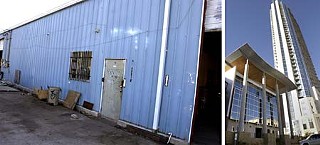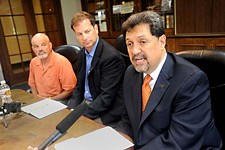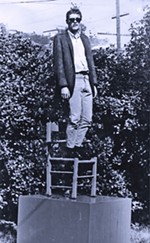Music Deportment
Assessing the Live Music Task Force recommendations
By Doug Freeman, Fri., Nov. 21, 2008

The Mohawk encapsulates both the promise and struggle of the contemporary Austin music scene. The venue has become a linchpin of Red River, transforming a continually failing club space into a local indie hub. The newly cemented wall encasing the outside stage also serves as a cold symbol of the uneasy balance between Downtown development and live music.
Owner James Moody lounges easily inside the dimly lit club. The recycled-wood walls and taxidermy animals give the empty venue the feel of a punk rock hunting lodge. As the clock rounds to 5pm, the bartenders begin stocking for the Thursday night crowd.
"What's happened traditionally is that the music [community] isn't organized, thoughtful, or on time," offers Moody, a partner in Transmission Entertainment, the local booking and promotion enterprise responsible for Fun Fun Fun Fest. "There's been a lot of conflict over the years, and music's just said, 'It's not even worth going,' so we'll just get run over, and then we'll drink a beer, and we'll bitch about it."
As Austin continues to grow, the music scene has largely fallen behind and failed to adapt. The charge falls partly against the city, whose trademarked claim as the live music capital of the world has rarely spurred substantial efforts to help foster its reality. Even more accountable is the actual music community, which has never coherently organized itself to petition its interests to City Council. This week, however, the Live Music Task Force (see "Can the Bands Play On?" July 18) presents its final recommendations to City Council.
The culmination of more than nine months of research and discussion from a diverse commission of local music and government representatives, the task force's recommendations are sweeping in scope and transformational in intent. The thrust of the task force's goals is the establishment of the Music Department within city government, an office that will shift the consideration of live music in Austin from a largely cultural priority to an economic one. That refocus ensures the local music industry an opportunity to capture the council's attention but could well enact unprecedented changes on the Austin music landscape and its relationship to local government.
Chief among the efforts of the new department, as outlined in the task force recommendations (www.cityofaustin.org/council/livemusictaskforce.htm), would be the much needed fostering of an infrastructure, promoted by government incentives and designed to cultivate development both locally and through the recruitment of national businesses. Such goals are rightly argued as vital to the sustainability of Austin music – live and otherwise – but they must also be tempered with concern for the independence that's always defined the local scene and outlook for the music community over purely political and economic gains.
"We're trying to ring the bell on what we think is possible," says Moody, who served on the Live Music Venues Subcommittee of the task force. "It hasn't been easy to be a start-up in this town. It's a very important time, and if we don't do this right, it could go the other way."
Suffragette City
The creation of the Music Department within the city manager's office serves as the cornerstone of the task force's recommendations to City Council. If and how council decides to implement such an administration will largely determine the effectiveness of the mayor's Year of Austin Music endeavor.
"Right now we have three city employees whose jobs touch on music, but it's not their primary focus," attests the mayor's chief of staff, Rich Bailey. "Because of the importance of music in Austin, we think there should be a department dedicated to the growth of the music business and subsequent growth of musicians making a living as musicians."
The department would offer the music community an invaluable foothold within the city government and facilitate communication between industry stakeholders while implementing and collecting venue fees for the city. How the proposed department is managed will be even more important, however. The recommendations specifically declare that "the Music Department (MD) should be independent of the existing Cultural Arts division, in part because of its focus on the 'for profit' nature and activity of live music and the role it plays in economic development."
The tasking of the department outside the umbrella of the Cultural Arts Division is important for redefining live music in Austin as a fundamentally economic interest.
"The recommendation of having an identified and specific Music Department under Economic Development is recognition of the economic impact of live music in Austin," asserts Bailey. "We had a study done in 2001 and again in 2005 that showed the economic impact of music in Austin at a billion dollars a year. Twenty-thousand people make their living in or around music; we have 8,000 musicians; $25 million a year in sales tax is generated by music, not to mention the festivals that we have: South by Southwest is $97 million; ACL brings in $36 to $37 million.
"This is about economic development.
"Some people are saying that this should be under Cultural Arts, and we're saying no, it's different," he continues. "Although music obviously is culture, our Cultural Arts department is more attuned to basically taking taxpayer money and saying we value cultural arts and we're going to put money into it, whereas music doesn't really need money given to it."
Austin's music scene, for better or worse, has held a largely laissez-faire relationship with city government, communication sparked from the community generally coming in the form of rare outbursts concerning sound ordinances and development. A centralized Music Department will give its community direct access to government yet also allow the city more direct influence and control over the music scene. With economic development serving as the primary motivation of the department, it's imperative that the music community finally organize itself coherently to ensure that its interests are validly represented rather than letting the department become an overwhelmingly governmental influence upon the music scene.

"I really think that how the city responds to the music community will be hinged upon who becomes part of the Music Department," says Bobby Garza, task force member and percussionist for Maneja Beto. "That's one of the things that musicians ought to be very concerned about. They need to ask who they're hiring and what their background is – how they feel about music and weigh in on that stuff. Council's never going to be able to make that decision on their own until we start hearing from venue folks and musicians."
We Built This City
The most valuable asset of Austin's music scene is its wealth of talent, yet there's a comparable dearth of local infrastructure to help musicians reach beyond Austin city limits. Cultivating the local music industry would not only allow artists more opportunities but is also an economic sector to which the city seems perfectly attuned and that could generate substantial revenues.
The task force recommends that the Music Department develop the infrastructure by recruiting outside businesses to relocate to Austin while creating and financing new assets within the community. The goal is to foster a self-sustainable industry with a national reach, including Austin-based record labels, PR firms, booking agents, management, and distribution.
"In Nashville, New York, and L.A., that infrastructure has been in place for decades, so we're playing catch-up to a lot of these cities," offers task force Chairman Paul Oveisi. "What we're asking for is a team that will speed up that whole catch-up process. Some of the stuff we have to go outside of Austin for – for example, making it attractive for national booking agencies, management, and distributors to set up shop here in Austin.
"But geography is becoming less and less important, so we have to sell the city on some other things, like quality of life, tax incentives, and other things."
Nashville provides a telling juxtaposition to just how neglectful Austin's city government has traditionally been toward the local music scene.
"The music office in Nashville is the mayor's office," laughs Jim Hester, a senior adviser to the Music City mayor. While Nashville doesn't have a designated music department within the city government, the music industry is an inherent priority for the Department of Economic and Community Development and the Chamber of Commerce. Nashville also benefits from professional associations within the music scene, with the mayor currently assembling a more comprehensive Music Business Council of industry representatives to serve as an advisory committee.
Lacking a similarly longstanding dedication to and organization of the music industry in Austin, the task force views its cultivation as similar to the city's efforts in becoming a technology center in the last decade, and the incentives that the city could provide would be invaluable to the music scene. Such recruitment of outside resources, however, would have to be done in close concert with local artists and existing businesses, focusing on the elements they need to supplement the local infrastructure rather than supplant it.
More important is the need to recognize that the music industry is rapidly changing, and rather than simply attempt to transpose already tenuous business models onto Austin, the city has the opportunity to foster the entrepreneurial opportunities that will define the future of the industry. With Austin's strong tech and gaming industries already in place, the city stands ripe to incubate new start-ups that would allow us not simply to play catch-up but leapfrog cities that are bound to traditional models.
Takin' It to the Streets
If the task force's recommendations are going to be approved by City Council and if they're to be implemented with due deference to the local scene's interests, responsibility falls upon the local music community to show its support and influence. The usually fractious and disengaged sentiments that have typically characterized the scene must be overcome to organize a coherent association and build upon the momentum of the task force.
"I think the city has met its obligation as far as having a real long conversation with very educated people about what the city can do better, and I think some of the onus is on us now as musicians to figure out how to speak as some semiunified voice," suggests Garza. "I was hoping this discussion could be the impetus for musicians to get together and talk about how to advocate for their own interests. Everybody else does that, and it seems silly that musicians don't do it."
However difficult it may prove to band musicians and professionals together, it's imperative in light of the influence that the government could potentially hold over the music scene and its development. Just as the Austin Independent Business Alliance galvanized behind Proposition 2 to voice its concerns over retail development within the city, so too must the music community form professional associations that will represent its interests with singular force.
Furthermore, such professional associations must strive to be as inclusive as possible, with larger companies and more established venues helping cultivate the prosperity of smaller and less entrenched businesses. Precisely because the Music Department would concentrate the government's ability to define standards and enforce regulations, the music community must become more involved on every level in asserting its role within the city at large.
"If you want to have an impact, you need to have the venue owners and the musicians who live within the neighborhoods go to those monthly meetings of the neighborhood associations and make them understand that you're part of the neighborhood as well and that you want to be good neighbors," says Bailey. "At the same time, if there are bad apples out there, the city needs to be prepared to say, 'We're going to shut you down or prescribe punitive action to you if you consistently do not take into account the issues that your sound has on the people who live within 500 or 600 feet of you.'"
City Council now has the opportunity to support the local music industry with tangible benefits and incentives, as well as returned rewards. Council should approve and allocate the budgetary funds for the creation of the Music Department but, more importantly, ensure that the city manager creates and staffs the office with regard to the task force's recommendations of music as an economic priority over a simply cultural value. Council will likely begin to act upon the recommendations presented on Nov. 20 during mid-December sessions, and funding would not be established until the 2009-2010 city budget. See "Live Music Task Force (of Millions)."
Until the Music Department is created, the task force has called for an interim individual or team to be appointed by the city that can begin addressing the recommendations and culminating resources. It's the music community, however, that must first act in showing its support to the City Council in concentrated force for the task force's recommendations and fight to oversee that they're properly implemented in order to preserve the very notion of Austin as the live music capital of the world.
"If we don't have this, what is it that we really have? What are we known for?" wonders Moody. "'The live condo capital of the world' is not very cool."











